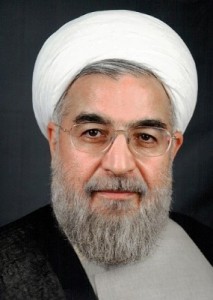By Joshua Miller
“Peace and Prudence” was the platform President Hassan Rouhani campaigned on in the recent Iranian elections. On June 15th, the Iranian people elected President Rouhani, a cleric considered moderate that appealed to reformists and traditional conservatives.
Among other pledges, Rouhani alluded to the ongoing sanctions on Iran that are tied to its nuclear program. In response, the White House signaled his inauguration to be “an opportunity” for Iran to “resolve the international community’s deep concerns over Iran’s nuclear program.” In sequence with his predecessors, Rouhani insisted that its nuclear program is purely for civilian nuclear energy.
Rouhani’s background is unlike any other Iranian President: a former commander of the Iranian air defenses, and the head of various defense and war councils; he also possesses three law degrees including a doctorate, and was a national security adviser to the President for over a decade. Additionally, he was Iran’s chief nuclear negotiator from 2003 to 2005 – during the presidency of Mohammad Khatami. “Because of his revolutionary credentials are absolutely impeccable, he’s very close to Khamenei, (Iran’s supreme leader)” and to the “security and military establishment,” Dabashi told CNN’s Fareed Zakaria.
President Rouhani’s affiliations do not indicate that he will be negotiating in any serious terms any time soon; Nazila Fathi, Research Fellow at Belfer Center at Harvard Kennedy School of Government noted, it’s not clear whether Khamenei’s “hard-line allies will allow Rouhani to introduce real change.” That being said, although the Ayatollah wields vastly more constitutional power in comparison to Rouhani, the president “sets the tone for domestic and foreign policy and can make more room for more moderate voices in politics.”
 When Rouhani assumed office in early August, he declared “I as president say the Islamic republic has a serious political intention to resolve the nuclear issue while maintaining our rights and trying to ease concerns of all parties in the short term.” When asked if the psychological and communicative gridlock between the U.S. and Iran will be broken, Rouhani highlighted that “White House statements are not in line with their practices,” in response to additional sanctions that were promulgated.
When Rouhani assumed office in early August, he declared “I as president say the Islamic republic has a serious political intention to resolve the nuclear issue while maintaining our rights and trying to ease concerns of all parties in the short term.” When asked if the psychological and communicative gridlock between the U.S. and Iran will be broken, Rouhani highlighted that “White House statements are not in line with their practices,” in response to additional sanctions that were promulgated.
Despite his apprehensions, Rouhani reassured the world that “for Iran’s peaceful nuclear program, we are ready to seriously and without wasting any time participate in serious negotiations… If other sides have the same notion, I am sure this issue will be solved in short time.”
Since the chemical attacks in Syria on August 21st, Iran has engaged diplomatically with those involved in the conflict. Recently, Alaeddin Borouierdi, the foreign affairs and national security head for the Iranian parliament, led a delegation Damascus to discuss the potential of a U.S. attack; Russian President Putin spoke with President Rouhani and the U.N. Undersecretary-General for Political Affairs Jeffrey Feltman’s talked to Iranian Foreign Minister Mohammad Javad Zarif. Additionally, the Sultan of Oman made a visit to Iran, the Gulf state that has been a reliable liaison between Iran and the United States in the past. This interaction is just one small facet and potential step to evaluate whether the U.S. and Iran is ready to communicate.
On September 5th, President Rouhani officially transferred nuclear talks to the foreign ministry in a shift away from security officials. A veteran western-educated diplomat, Foreign Minister Mohammad Javad Zarif, will assume the position as Iran’s top nuclear negotiator. Iran’s Supreme National Security Council was formerly in charge of the nuclear dialogue which was characterized with gridlock as the status quo. Perhaps this shift is a move to lighten the tension and try a different route of resolution; or it could be an excuse for Rouhani to continue with diplomatic rhetoric but pursue his ulterior motives.
Perhaps a better indicator will be at the 68th session of the U.N. General Assembly this September, where President Obama as well as President Rouhani are both scheduled to talk in front the nations of the world.


